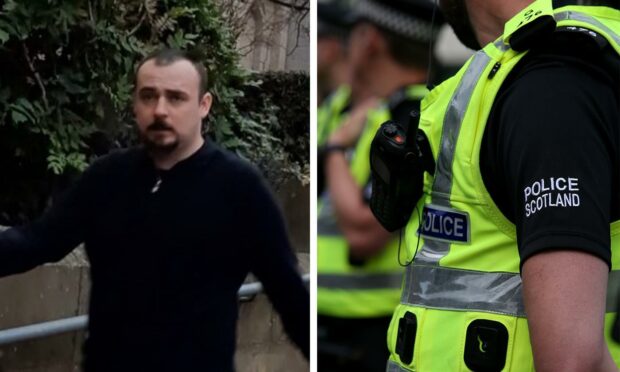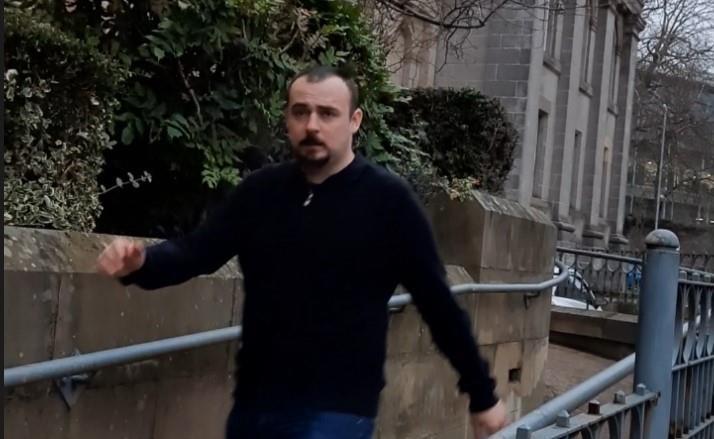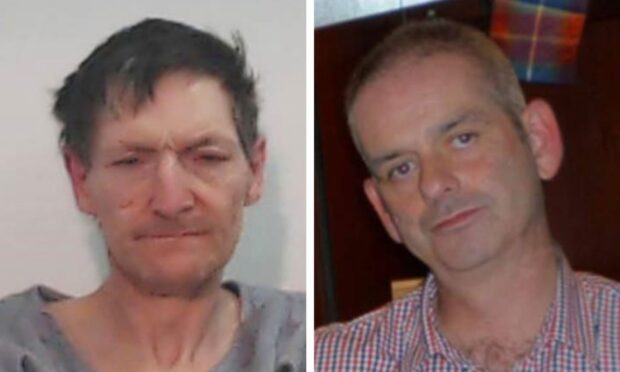A police officer whose leg was broken during an arrest has expressed his “anger and frustration” after the man responsible was not jailed.
PC John Annand required emergency surgery and still suffers significant pain after Connor Collins landed on his leg during his arrest in Forfar last year.
Collins admitted threatening to break the officer’s leg during the incident and the sheriff conceded “it merits a custodial sentence”.
However, he was instead ordered to carry out 180 hours of unpaid work and placed on curfew for assaulting PC Annand and another officer.
‘I may as well have been in prison’
Speaking to 1919 magazine, PC Annand, 39, described the incident and the gruelling aftermath.
“I knew the case would be coming to court at some point but it was only when I was in the shop and saw a headline in the Evening Telegraph about a police officer having his leg broken that I found out about the sentence.
“I wasn’t sure how to react – I know my colleagues were really furious about it.
“I thought of how my time was spent after it, stuck at home not able to do anything or go anywhere.
“Because of Covid I couldn’t even have anyone visit me.
“It was like Groundhog Day – in some ways I may as well just have been in prison, that’s what it was like.
“But this guy isn’t getting any of that, he’s just walking back out of court.
“Thinking about the sentence and what happened, there’s a bit of anger and frustration about it.”
‘I’ll break your f***ing legs’
Dundee Sheriff Court heard PC Annand attended the domestic disturbance with a colleague on September 16.
Burly Collins, 24, yelled at them: “I’ll break your f***ing legs.”
PC Annand said: “It was pretty clear the guy could kick off and he made it known he didn’t like the police very much.
“During the incident my colleague fell so it was just me and him.
“I knew he had to be restrained and he was clearly under the influence.”
The pair struggled and Collins fell on top of PC Annand’s right leg.
As the officer lay on the ground, with his ankle so badly injured his foot was facing the wrong direction, Collins yelled: “I hope that f***ing hurt.”
Expect courts to back you up
The sentence was slammed by the chair of the Scottish Police Federation David Hamilton, who called Collins an “animal” and said there is no consistency in sentencing.
PC Annand, a father of two, said: “The thing is, I don’t know the guy, what he does, or how he lives his life.
“I don’t have a personal vendetta against him – I was just there responding to a call and he did what he did.
“But this will be with me the rest of my life.
“I’ve got a pin in my leg which means I’ll get stopped every time I go through an airport or a metal detector.
“Even now I’m seeing the doctor about the continued pain I have been experiencing.
“With all that, you expect the courts to back you up, to show in their sentencing that this isn’t on.
“But they didn’t – the opposite happened and that’s why I think a lot of police officers don’t think they are being taken seriously when things like this happens.”
Less respect for police
Yet to return to frontline duties and still suffering burning pain when he walks, PC Annand describes himself as being at around 90% fitness and is keen to continue a career in the police, even if that means a change of roles “and not wrestling on the street so much”.
“The issue is I know I have a weakness now in my leg and that’s always going to be in the back of my mind when I’m responding to an incident.”
Even in the 12 years he has been in the force, PC Annand says he has noticed a change in attitudes towards police.
“There’s definitely less respect, even compared to when I started.
“When I was growing up everyone respected the police one way or another but that’s changed, especially with younger folk.
“They think they can have a go.
Maybe because there aren’t as many on the streets going to incidents people feel like they’ve got more of a chance if they take on the police”
“They’re into different things, a lot of them are different in size because of use of the gyms and the growing popularity of mixed martial arts.
“It definitely presents a challenge.
“Maybe because there aren’t as many on the streets going to incidents people feel like they’ve got more of a chance if they take on the police.
“And maybe they know they won’t get that much of a punishment when they go to court.”
Influence in courts
He added the passing of time and the radically different environment of a court setting could influence the severity of sentences.
“As police officers you don’t generally see the crime but you do see the aftermath.
“You see victims, their bruises or injuries, you see them in tears.
“But the court case comes up to a year after that, sometimes more.
“There are no bruises, no tears and often people can’t even remember the details because it was so long ago.
“Maybe that’s part of the reason for the sentencing in this case, I don’t know.”
Judicial response
A Judicial Office for Scotland spokesperson said after Mr Hamilton’s criticism: “When deciding a sentence, sheriffs must consider the facts that are presented to the court by the prosecution and by the defence.
“Sheriffs must take into account the unique factors of each case based upon what is presented in court.
“Sheriffs carefully consider the circumstances of the particular offence as presented; the circumstances of the offender and the impact on the victim.
“Sheriffs must also have regard to the Scottish Sentencing Council guideline on the principles and purposes of sentencing.”











